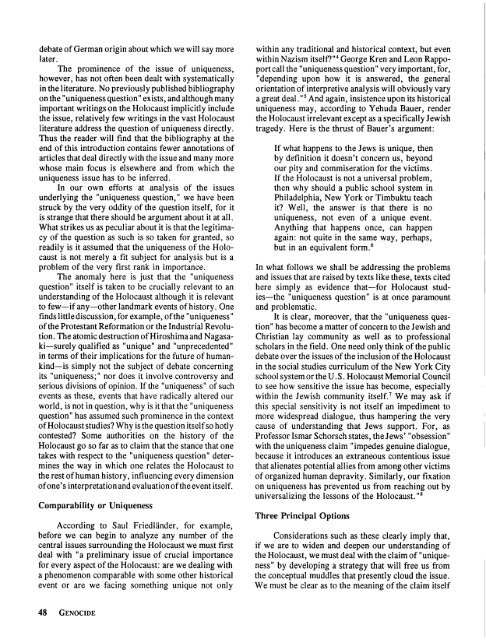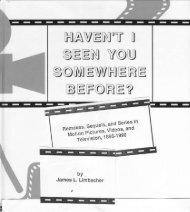DOWNLOAD Genocide in Our Time - NewFoundations
DOWNLOAD Genocide in Our Time - NewFoundations
DOWNLOAD Genocide in Our Time - NewFoundations
You also want an ePaper? Increase the reach of your titles
YUMPU automatically turns print PDFs into web optimized ePapers that Google loves.
debate of German orig<strong>in</strong> about which we will say morelater.The prom<strong>in</strong>ence of the issue of uniqueness,however, has not often been dealt with systematically<strong>in</strong> the literature. No previously published bibliographyon the "uniqueness question" exists, and although manyimportant writ<strong>in</strong>gs on the Holocaust implicitly <strong>in</strong>cludethe issue, relatively few writ<strong>in</strong>gs <strong>in</strong> the vast Holocaustliterature address the question of uniqueness directly.Thus the reader will f<strong>in</strong>d that the bibliography at theend of this <strong>in</strong>troduction conta<strong>in</strong>s fewer annotations ofarticles that deal directly with the issue and many morewhose ma<strong>in</strong> focus is elsewhere and from which theuniqueness issue has to be <strong>in</strong>ferred.In our own efforts at analysis of the issuesunderly<strong>in</strong>g the "uniqueness question, " we have beenstruck by the very oddity of the question itself, for itis strange that there should be argument about it at all.What strikes us as peculiar about it is that the legitimacyof the question as such is so taken for granted, soreadily is it assumed that the uniqueness of the Holocaustis not merely a fit subject for analysis but is aproblem of the very first rank <strong>in</strong> importance.The anomaly here is just that the "uniquenessquestion" itself is taken to be crucially relevant to anunderstand<strong>in</strong>g of the Holocaust although it is relevantto few — if any — other landmark events of history. Onef<strong>in</strong>ds little discussion, for example, of the "uniqueness"of the Protestant Reformation or the Industrial Revolution.The atomic destruction of Hiroshima and Nagasaki— surely qualified as "unique" and "unprecedented"<strong>in</strong> terms of their implications for the future of humank<strong>in</strong>d— is simply not the subject of debate concern<strong>in</strong>gits "uniqueness;" nor does it <strong>in</strong>volve controversy andserious divisions of op<strong>in</strong>ion. If the "uniqueness" of suchevents as these, events that have radically altered ourworld, is not <strong>in</strong> question, why is it that the "uniquenessquestion" has assumed such prom<strong>in</strong>ence <strong>in</strong> the contextof Holocaust studies? Why is the question itself so hotlycontested? Some authorities on the history of theHolocaust go so far as to claim that the stance that onetakes with respect to the "uniqueness question" determ<strong>in</strong>esthe way <strong>in</strong> which one relates the Holocaust tothe rest of human history, <strong>in</strong>fluenc<strong>in</strong>g every dimensionof one's <strong>in</strong>terpretation and evaluation of the event itsel f.Comparabilityor UniquenessAccord<strong>in</strong>g to Saul Friedlander, for example,before we can beg<strong>in</strong> to analyze any number of thecentral issues surround<strong>in</strong>g the Holocaust we must firstdeal with "a prelim<strong>in</strong>ary issue of crucial importancefor every aspect of the Holocaust: are we deal<strong>in</strong>g witha phenomenon comparable with some other historicalevent or are we fac<strong>in</strong>g someth<strong>in</strong>g unique not onlywith<strong>in</strong> any traditional and historical context, but evenwith<strong>in</strong> Nazism itself? "4 George Kren and Leon Rappoportcall the "uniqueness question" very important, for,"depend<strong>in</strong>g upon how it is answered, the generalorientation of <strong>in</strong>terpretive analysis will obviously varya great deal. "' And aga<strong>in</strong>, <strong>in</strong>sistence upon its historicaluniqueness may, accord<strong>in</strong>g to Yehuda Bauer, renderthe Holocaust irrelevant except as a specifically Jewishtragedy. Here is the thrust of Bauer's argument:If what happens to the Jews is unique, thenby def<strong>in</strong>ition it doesn't concern us, beyondour pity and commiseration for the victims.If the Holocaust is not a universal problem,then why should a public school system <strong>in</strong>Philadelphia, New York or Timbuktu teachit? Well, the answer is that there is nouniqueness, not even of a unique event.Anyth<strong>in</strong>g that happens once, can happenaga<strong>in</strong>: not quite <strong>in</strong> the same way, perhaps,but <strong>in</strong> an equivalent form. 'In what follows we shall be address<strong>in</strong>g the problemsand issues that are raised by texts like these, texts citedhere simply as evidence that — for Holocaust studies— the "uniqueness question" is at once paramountand problematic.It is clear, moreover, that the "uniqueness question"has become a matter of concern to the Jewish andChristian lay community as well as to professionalscholars <strong>in</strong> the field. One need only th<strong>in</strong>k of the publicdebate over the issues of the <strong>in</strong>clusion of the Holocaust<strong>in</strong> the social studies curriculum of the New York Cityschool system or the U. S. Holocaust Memorial Councilto see how sensitive the issue has become, especiallywith<strong>in</strong> the Jewish community itself. ' We may ask ifthis special sensitivity is not itself an impediment tomore widespread dialogue, thus hamper<strong>in</strong>g the verycause of understand<strong>in</strong>g that Jews support. For, asProfessor Ismar Schorsch states, the Jews' "obsession"with the uniqueness claim "impedes genu<strong>in</strong>e dialogue,because it <strong>in</strong>troduces an extraneous contentious issuethat alienates potential allies from among other victimsof organized human depravity. Similarly, our fixationon uniqueness has prevented us from reach<strong>in</strong>g out byuniversaliz<strong>in</strong>g the lessons of the Holocaust. "'Three Pr<strong>in</strong>cipal OptionsConsiderations such as these clearly imply that,if we are to widen and deepen our understand<strong>in</strong>g ofthe Holocaust, we must deal with the claim of "uniqueness"by develop<strong>in</strong>g a strategy that will free us fromthe conceptual muddles that presently cloud the issue.We must be clear as to the mean<strong>in</strong>g of the claim itself48 GENOCIDE



